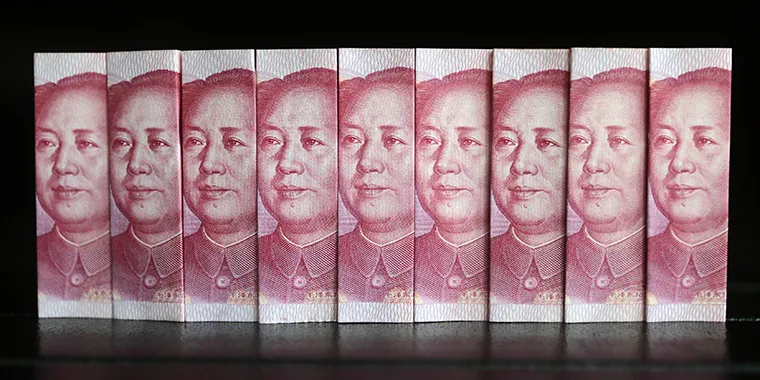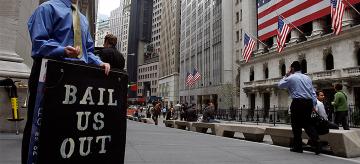Foreign Investment 101
What is foreign investment, and what does it have to do with trade? An economics expert explains.
Brad Setser is an economics expert at the Council on Foreign Relations, where he has a blog called Follow the Money. He broke down the basics of foreign investment—what it is, why it matters, and how it relates to international trade—in the following Q&A, which was conducted in December 2018 and has been edited and annotated for clarity.
WHAT IS FOREIGN INVESTMENT?
Q: What is foreign investment, in simple terms?
A: The main categories of foreign investment are foreign direct investment (FDI), which would be a company building a factory or a company buying another company across a border.
Another category is portfolio investment, which is companies buying another country’s stocks and bonds.
So the difference is that with foreign direct investment there is a transfer of control, whereas if you just buy an individual share in a company, you do not control the company.
Q: Why would companies want to invest abroad? What is the benefit to them?
A: Companies make products or produce services and then they sell them to people. There are a lot of people outside the United States, and there are different ways you can try to sell a good or service to them.
One way is you can make the good in the United States, and then export it. That is just trade. Another way is that you can use your knowledge and your firm’s experience to make the good abroad, and then you sell abroad. This would be FDI.
There are several reasons why companies go abroad:
(A) Some things, particularly services, are often difficult to produce remotely.
The stereotypical service is a haircut. You have to be in physical proximity to the person whose hair is being cut. Typically, we do not have major international companies providing haircuts, but some big services often require a physical presence, which means direct investment.
Think of, say, telecommunications—a huge service that typically requires having a network, which means having cell phone towers and fiber optic cable and all the other equipment needed to knit together a network so that people can talk to each other. If you want to sell access to that network you either need to own a physical presence or rent access to someone else’s network.
(B) There are frictions at the border such as tariffs or other barriers.
If you want to hop over a tariff barrier you can produce inside the country whose market you are trying to sell in.
(C) Sometimes firms make investments as part of a strategy for reducing their tax burden.
This is not the most savory aspect of globalization. But U.S. firms have, for example, bought Irish firms in order to become Irish and thus take advantage of Ireland’s lower overall corporate tax rate. And U.S. firms have large investments in many countries known for their low corporate tax rates at least in part because they prefer to record a portion of their profits in these countries rather than have all their profits taxed in the United States. If you look at the overall data, a large share of total U.S. foreign investment abroad is now in a low-tax jurisdiction.
WHO INVESTS, AND WHERE?
Q: Most foreign investment is done by companies, so why do we often hear about countries investing in other countries, such as “Chinese investment in the United States?”
A: In some cases, geographic origin is important because different countries’ economies have different characteristics. Most companies are privately owned. Some countries such as China have different economic structures; there are going to be more state-owned enterprises. Given the nature of China’s economy, an investment from China is quite possibly going to be coming from a state-owned company or a company with close ties to the Chinese Communist Party.
Q: Who are the recipients of foreign investment? Should we think of them as countries, or companies?
A: You tend to talk about the country receiving investment because the investment is going to a geographic location. So “GM, an auto company, is investing in China”—that is an accurate description. But if you are saying, “The United States is investing in China,” that equates GM with the United States in a way that is unhelpful.
These countries received the most FDI in 2019:
WHY DO COUNTRIES ACCEPT OR REJECT FOREIGN INVESTMENT?
Q: Can you help us understand the benefits of foreign direct investment for countries on the receiving end? The benefits seem pretty clear when it comes to greenfield investment, which is when a company builds a new factory from the ground up, hiring new employees and helping the local economy expand. But does incoming FDI always help a country’s economy?
A: A lot of foreign direct investment is not greenfield. A lot of foreign direct investment these days involves a merger or an acquisition, having a foreign company take over a local company.
In some cases they will be buying the local company because they want to make a bunch of new investments and help it grow. But in other cases they may be looking to cut costs, which could mean laying people off, reducing salaries, or scaling back operations. In short, it depends.
Q: Why would the U.S. government be wary of allowing inward foreign investment?
A: The United States generally has an open approach toward foreign direct investment coming in. The presumption is that companies who are investing in the United States are helping the U.S. economy.
But large investments are subject to a national security review, which is done by the Committee on Foreign Investment in the United States (CFIUS). Typically that would happen because the investment is coming from a country or a company that arouses concerns about security.
Some transactions have gotten a lot of attention, in which there have been questions about national security, fairly or unfairly. One was the DP World purchase of a U.S. port at a time when there were concerns about terrorism. There has been a set of Chinese offers to buy U.S. technology companies, which generally have been blocked.
Q: What are some examples of countries that have not been as open to investment as the United States?
A: China, broadly speaking, has had the opposite approach: you need explicit approval to invest in China. Many companies have received approval and have a large presence in China, but the ability to invest in China cannot be assumed.
WHAT ARE THE RULES FOR FDI?
Q: To regulate trade, countries created the World Trade Organization (WTO). Countries have not made an international agreement for foreign investment, leaving the rules to be decided on a case-by-case basis. Why is that?
A: Both trade and investment can be viewed as a matter of sovereignty. Sovereign countries can, in theory, do what they like when it comes to limiting and encouraging trade and investment.
But in order to facilitate trade, countries have agreed through the WTO to limit tariffs to a certain level. The idea is that everybody has tied their hands. Of course not everyone has tied their hands in precisely the same way—different countries have different tariffs on different products. But in general, there is an agreed set of tariffs and an organization that polices those tariffs.
On the investment side, there are countries that have not been willing to enter into the same kind of commitment. As a result, countries have more authority to have different policies toward inward investment.
HOW ARE PROBLEMS RESOLVED?
A: Companies can sue countries and raise a case before an international tribunal, arguing that they should be compensated for the loss of value of their investment in a given country.
It is a way for companies to get money from countries that change their laws in a way that affects a company’s investment. It was intended primarily as a protection against expropriation—when a government takes away an investment in its country after it has been made. But it has been used to challenge regulations as well.
Famously, cigarette companies have sued countries that tightened regulation on smoking. Australia passed a law requiring cigarettes to be labeled “smoking kills” with graphic pictures of smoking-induced diseases. Philip Morris, an American company, had invested in Australia. It used the ISDS mechanism, technically the mechanism in Australia’s 1993 trade agreement with Hong Kong, to argue that Australia’s new law decreased the value of their investment.
The tribunal’s decision was whether to award damages, or money—not whether to reverse the policy. Phillip Morris could not force Australia to change back its laws. But the damages could be high. It raises some basic questions: if you make a decision to regulate cigarettes, why should you give damages to a foreign company but not a domestic company? It has become hugely controversial, with many arguing that these treaties go too far in tying sovereign countries’ hands.
WHY SHOULD WE CARE?
Q: What do the effects of foreign direct investment mean for businesses and people?
A: It depends on your perspective.
Big global companies tend to think about how they can get market access. They are experienced at investing abroad, so they are comfortable if obtaining market access requires making an investment in another country. They also would like policy changes that make it easier to produce something in the United States and then export it to another market, or policy changes that make it easier to produce a good abroad and sell it back to the United States.
With investment as well as with trade, there are inevitable industry adjustments, when competition or technology creates “winners and losers.”
In the old days, for example, a factory would be shut down because it could not compete with imports. The company that owned the factory and the workers making the product that competed with imports would both be forced to adjust. Often now, a factory is shut down because the multinational firm that owns it has decided it wants to make the product somewhere else around the world. And on the other hand, firms from around the world can create jobs in the United States when they decide to open up a factory there. As a practical matter, those have different consequences for our economies.
A lot of these policy issues seem a little abstract, but the odds are that a part of your working life will be in a multinational firm and a lot of people will be making decisions about where that firm invests and where it puts factories . . . it is embedded in modern commercial life.







